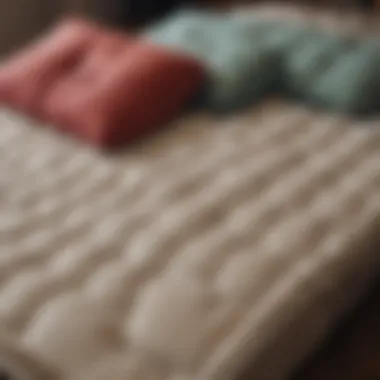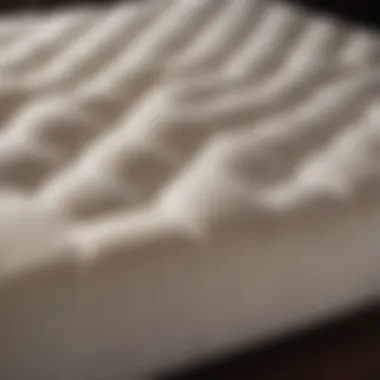Ultimate Guide to Selecting a Futon Mattress for Sleep


Intro
When choosing a futon mattress for daily sleep, the decision can feel overwhelming. There are many options available, and making a choice requires careful consideration. This guide will simplify the process. It will dissect crucial aspects like comfort, material quality, and maintenance while avoiding common mistakes. The goal is to equip you with knowledge to enhance your sleeping experience effectively.
Design Inspirations
Creating a harmonious living space goes beyond comfort. The futon mattress you select should also suit your home's interior design. Here, we explore trending styles and color palettes to help you find the perfect match.
Trending Styles
Futon mattresses come in various designs. Many homeowners prefer a minimalist style that emphasizes simplicity. Others may lean towards traditional designs that offer a classic look. When selecting a style, consider your existing decor and personal taste. Modern, sleek lines may fit well in a contemporary home, while ornate patterns often enhance a more classic ambiance.
- Minimalist: Focus on clean lines and neutral colors.
- Traditional: Ornate patterns and richer colors.
- Mid-Century Modern: Retro patterns with bright colors.
Color Palettes
The color of your futon mattress can set the tone for your space. Neutral tones like beige, gray, and white are versatile, easily combined with various decor styles. Bright colors, on the other hand, can serve as statement pieces, adding a pop to your room. Consider how the accompanying furniture and accessories will interact with your chosen palette.
- Neutral Colors: Ideal for a sophisticated look.
- Bold Colors: Great for creating focal points.
- Pastel Shades: Soft and soothing atmosphere.
"Choosing a futon mattress that complements your space is as important as its comfort."
Practical Considerations for Comfort
Comfort is key for a futon mattress used daily. Look at the thickness and density. A thicker mattress often provides better support. Consider options made from memory foam or latex, known for their comfort. Additionally, check for materials that are breathable and hypoallergenic. This ensures a good sleeping environment.
- Thicker Mattresses: Generally more supportive.
- Memory Foam: Adapts to body shape, reducing pressure points.
- Latex: Offers durability and breathability.
Maintenance Tips
Futon mattresses can require care to maintain their quality over time. Regularly fluff the mattress to prevent it from losing shape. Use a protective cover to keep it clean from stains and spills. Periodically airing out the mattress can also help maintain freshness. Consider rotating the futon every few months for even wear.
Common Pitfalls to Avoid
When selecting a futon mattress, some faults can contribute to an unsatisfactory experience. Avoid overly cheap options as they may sacrifice comfort and durability. Ensure the mattress is the right size for your futon frame and avoid complicated care instructions whenever possible.
- Cheap Materials: Can lead to discomfort and wear.
- Wrong Sizes: May not fit properly with your futon.
- Complex Care: Difficult to maintain, can discourage usage.
By taking these considerations into account, you can confidently choose the right futon mattress for your needs. This guide aims to streamline the decision-making process, ensuring your sleeping environment remains comfortable and aesthetically pleasing.
Understanding Futon Mattresses
Futon mattresses offer unique versatility and are an increasingly popular choice for everyday sleeping solutions. Understanding futon mattresses is key, as they serve various purposes. They can function as both a bed and a seating arrangement. Their adaptability makes them suitable for a variety of living situations.
When choosing a futon mattress, one must consider its core characteristics. First, it needs to provide adequate comfort and support. Inadequate support can lead to poor sleep quality over time, contributing to discomfort and potential health issues. Additionally, the functionality aspect must be assessed. For instance, can the mattress transition smoothly from bed to couch? These elements make understanding futon mattresses significant for anyone considering them for daily use.
Definition and Functionality
A futon mattress is typically defined as a thin mattress designed to be used on a folding frame. In its most basic form, it consists of layers of cotton and other materials, which are layered and sewn together. Unlike traditional mattresses, futons are designed to be flexible, enabling them to fold easily.
The primary function of a futon mattress is to provide a sleeping surface while maximizing space. This feature is particularly beneficial in smaller homes or multipurpose rooms. When not in use as a bed, it can be easily transformed into a sofa, thus conserving valuable floor space. Its lightweight nature also contributes to ease of movement, allowing homeowners to rearrange their spaces as needed.
Historical Context
The history of futon mattresses dates back centuries, originating in Japan. Traditional Japanese futons consist of fabric and cotton fillings, providing a sleeping option suitable for tatami flooring. Initially, they were used as bedding that could be stored away during the day, reflecting a culture of minimalism and space efficiency.
As western influences grew, futons evolved. They adapted to meet diverse needs, leading to the creation of various styles and materials in modern futon mattresses. Today, they are widely available in numerous stores and are appreciated for their practical adaptability by both homeowners and renters. Understanding this historical context can enhance your appreciation for the futon’s journey and its current value in contemporary living spaces.


Factors to Consider When Choosing a Futon Mattress
Choosing the right futon mattress is not just about comfort; it involves a spectrum of factors that collectively impact your overall sleeping quality. Each element plays a significant role in ensuring that the mattress meets your daily sleeping needs. Understanding these factors will not only enhance your sleep experience but also promote better health and well-being. Here, we will explore critical aspects that contribute to making an informed decision.
Size and Dimensions
When selecting a futon mattress, size is a fundamental consideration that directly affects its usability. Futon mattresses come in various dimensions, including twin, full, and queen sizes. Depending on the space available in your home, the mattress size must complement your futon frame and fit seamlessly into your designated area.
Measuring your futon frame ensures that the mattress will not be too small or excessively big, leading to discomfort.
- Room Size: Consider the room where the futon will be used. A larger mattress in a small space may hinder movement and make the room feel cramped.
- Comfort: A mattress that's too small might not offer adequate support, which becomes crucial for restful sleeping.
Thickness Considerations
The thickness of a futon mattress is equally important to its comfort level. Generally, futons can range from about 6 inches to over 10 inches thick. The right thickness provides necessary support while also accommodating personal sleep preferences. A thicker mattress often corresponds to higher comfort and can help in alleviating pressure points during sleep.
- Comfort Level: If you prefer a plush feel, selecting a thicker mattress may be advantageous. For those who enjoy firmer support, a thinner option might suffice.
- Usage Frequency: If the futon will be used for everyday sleeping, a thicker mattress may offer better durability and comfort over time.
Sleep Position Compatibility
Your preferred sleep position significantly influences the kind of futon mattress you'll want to purchase. Whether you are a side, back, or stomach sleeper, the mattress must provide the right level of support based on your sleeping posture. This compatibility is crucial for preventing discomfort and promoting better sleep.
- Side Sleepers: They often require a softer mattress with more give to cushion the shoulders and hips.
- Back Sleepers: A medium-firm mattress that promotes spinal alignment without too much sinking is generally ideal.
- Stomach Sleepers: A firmer mattress can help maintain proper spinal alignment and prevent excessive arching of the back.
Weight and Portability
Futons can vary in weight based on materials and construction, making it essential to consider how mobile you want your mattress to be. If you plan to move the futon frequently, a lighter mattress will facilitate easier handling and transport.
- Heavy Options: These tend to offer better durability and support but may be challenging to maneuver.
- Lightweight Choices: They are easier to handle but may compromise on some comfort aspects.
Moreover, easy portability allows for better flexibility in usage, especially in multi-purpose areas that require rearranging seating or sleeping arrangements.
By assessing these factors carefully, homeowners can choose a futon mattress that aligns with their specific needs, leading to a sustainable and comfortable sleeping situation.
Material Options in Futon Mattresses
Selecting the right material for a futon mattress is pivotal in ensuring both comfort and durability. The material affects the overall feel, support levels, and maintenance of the mattress—features that matter significantly to everyday sleepers. Understanding the pros and cons of various materials helps consumers make well-informed choices suitable for their personal sleeping needs.
Cotton Futon Mattresses
Cotton futon mattresses are traditionally popular due to their natural composition and breathability. Composed mainly of cotton batting, these mattresses tend to be firm yet comfortable, ideal for those who prefer a more supportive sleep surface. One of the primary advantages of cotton is its moisture-wicking capabilities, which helps in regulating body temperature.
However, cotton mattresses might require regular fluffing to maintain their shape. They are also prone to compressing over time, particularly with heavy usage. When considering a cotton futon mattress, look for organic or high-quality cotton options as they will provide better durability and comfort.
Polyester and Blended Materials
Polyester futon mattresses offer a different experience, often being more affordable and offering a softer feel. These mattresses sometimes combine polyester with cotton or other materials, creating a blend that aims to balance comfort with resilience. While polyester provides excellent durability and is less prone to wear and tear, it can trap heat, leading to discomfort during warmer months.
Choosing a blended material can be a smart move for those seeking a light, low-maintenance solution. However, be informed that blended materials may not provide the same level of breathability as pure cotton. Always check the blend ratios to ensure you are choosing a material that aligns with your comfort needs and personal preferences.
Memory Foam vs. Latex
Memory foam and latex are two modern materials gaining popularity in the futon market. Memory foam conforms to body shapes, offering excellent pressure relief. This makes it an appealing choice for those with joint pain or specific sleep position requirements. However, traditional memory foam can retain heat, causing discomfort for sleepers sensitive to temperature changes.
On the other hand, latex mattresses are known for their bounce and support. They are often more breathable than memory foam, preventing heat buildup, hence ensuring a cooler sleep environment. Natural latex materials come from rubber trees, providing an eco-friendly option. The downside can be their weight, making them less portable.
"When selecting a futon mattress, consider how each material will impact your sleeping comfort and personal well-being."


Understanding these material options arms the buyer with knowledge not only about comfort but also about longevity, maintenance, and expense—key factors in making an informed choice.
Assessing Comfort and Support
When selecting a futon mattress, comfort and support are paramount. Achieving a balance between these two factors can have profound effects on sleeping quality, overall health, and daily functioning. A mattress that offers both adequate support and comfort ensures proper alignment of the spine, reduces pressure points, and improves the experience of rest. This section delves into essential elements that contribute to comfort and support, helping readers to make informed decisions.
Firmness Options
Firmness is a critical aspect of a futon mattress. The level of firmness can greatly influence personal sleeping experience. Generally, firmness options can range from soft to very firm. Soft mattresses tend to cradle the body, providing a plush feel. This can be beneficial for side sleepers as they may require more cushion to accommodate their shoulders and hips.
On the other hand, firmer mattresses offer greater support and can be advantageous for back and stomach sleepers, who need to maintain proper spinal alignment. When choosing a futon mattress, it is crucial to consider personal sleeping position and preference. Most brands provide some guidance on firmness, but trying out the mattress is always the best way to gauge comfort.
Pressure Relief Features
Pressure relief features are vital in a futon mattress, particularly for those who sleep for prolonged periods. A mattress with adequate pressure relief can alleviate discomfort caused by pressure points. These points typically occur in areas like the hips, shoulders, and lower back. To gauge the effectiveness of pressure relief, look for materials that distribute body weight evenly and adapt to body contours. Memory foam and latex are common materials that excel in this category.
Furthermore, many futon brands incorporate zoned support systems. These systems strategically provide varying firmness levels across different areas of the mattress, enhancing support where it is needed most. This can significantly improve comfort during longer sleep periods.
Breathability and Temperature Regulation
Breathability and temperature regulation are often overlooked but play a key role in sleep quality. A futon mattress should facilitate airflow to prevent heat retention. When a mattress traps heat, it can lead to discomfort and disrupted sleep.
Materials like cotton and wool typically offer good breathability. Additionally, certain types of foam come with built-in cooling technologies. If you sleep hot or experience night sweats, choosing a futon mattress with these features can make a significant difference. It's advisable to check product specifications regarding moisture-wicking technologies and cooling properties.
"Choosing a futon mattress that meets your comfort and support needs is essential for ensuring restorative sleep each night."
In summary, assessing comfort and support involves careful consideration of firmness levels, pressure relief features, and breathability. Each of these elements directly impacts how well a futon mattress performs as a sleeping surface. By prioritizing these features, readers can enhance their sleeping experience and ensure their futon mattress serves them well for years to come.
Popular Brands and Models
Understanding popular futon mattress brands and models is crucial for making an informed selection. This section will cover not just the brands themselves but also their unique offerings, which can significantly impact your experience of comfort and durability. The quality of a mattress is often reflective of the brand behind it, and therefore, choosing a well-reputed brand can lead to better long-term satisfaction.
Top Brands in the Futon Market
Several brands have established themselves as leaders in the futon mattress industry. Here is a closer look at a few top contenders:
- DHP: Known for their affordable and versatile options, DHP offers a variety of designs and materials that appeal to different preferences.
- Serta: Serta is renowned for its emphasis on comfort and support. Their futon mattresses often feature advanced materials that cater to restful sleep.
- Nirvana Futons: Focused on eco-friendly materials, Nirvana Futons emphasizes natural fibers and unique blends. They are popular among environmentally conscious consumers.
- LUCID: A brand that utilizes memory foam technology, LUCID often receives praise for its adaptive support and overall comfort.
These brands vary in their customer service, price points, and available options. It's wise to explore each further to determine the best fit for your particular needs.
Feature Comparisons Among Brands
When comparing brands, several features stand out. Here are key elements to consider:
- Material Quality: Brands often differ in the types of materials used. For example, cotton versus memory foam impacts both the feel and durability.
- Warranty Options: Many futon mattress brands provide different warranty lengths. A longer warranty can indicate greater reliability and customer confidence.
- Price Range: Price varies significantly and should align with your budget. Premium brands often justify higher prices with better materials and construction.
- Availability of Sizes: It is essential to ensure the brand offers the sizes you need, whether it be twin, full, or queen size.
A careful evaluation of these features can guide your purchasing decision effectively, ensuring you focus on what aligns best with your sleeping habits.
Customer Reviews and Feedback
Customer feedback serves as a valuable resource when assessing futon mattresses. Here are several guidelines to keep in mind:
- Online Reviews: Websites like Amazon or specialty stores often feature extensive customer reviews. Look for patterns in feedback, particularly concerning comfort and durability.
- Social Media: Platforms such as Facebook often have consumer groups discussing specific brands and providing firsthand accounts of their experiences.
"Reading real user experiences can provide insights that specifications alone cannot offer."
- Discussion Forums: Websites like Reddit host discussion threads that can yield surprising information and tips about specific futon models or brands.


Overall, leveraging customer reviews can elevate your understanding, allowing you to assess how a futon mattress may perform in everyday situations.
By focusing on recognized brands and their specific features, as well as listening to the experiences of other sleep enthusiasts, you can make an informed and confident choice. Understanding what each brand offers lays a strong foundation for selecting the right futon mattress for your everyday sleeping needs.
Maintenance and Care for Futon Mattresses
Proper maintenance and care for futon mattresses is crucial for maximizing their longevity and ensuring a comfortable sleeping experience. Just like any significant investment in home furnishings, futon mattresses require attention to detail regarding their upkeep. Regular care not only prolongs the mattress's life but also retains its structural integrity and comfort. Without appropriate maintenance, even the highest quality futon mattress can deteriorate quickly, leading to decreased comfort and unnecessary expense in replacing it.
Cleaning Guidelines
To maintain the cleanliness of your futon mattress, follow these suggested cleaning guidelines:
- Spot Cleaning: Address spills and stains as soon as they occur. Blot the area with a clean cloth and mild detergent mixed with water. Avoid soaking the fabric as this can lead to dampness and mildew.
- Vacuuming: Regularly vacuum your futon mattress to remove dust and dirt. Use a hand-held vacuum or an upholstery attachment to ensure you do not miss any corners or crevices.
- Baking Soda: To eliminate odors, sprinkle baking soda over the mattress surface. Leave it on for several hours, then vacuum it away. This process can refresh the material and keep it smelling clean.
- Washable Covers: If your futon has a removable cover, ensure you wash it according to the manufacturer's instructions. Regular washing not only keeps it looking good but also helps reduce allergens.
- Professional Cleaning: For deeper cleaning, consider hiring a professional cleaning service that specializes in upholstery, especially if your futon mattress is heavily stained or soiled. They have the right equipment and solutions to ensure thorough cleaning without damaging the fabric.
Storage Tips for Longevity
In scenarios where you need to store your futon mattress, proper storage techniques are essential for preserving its condition:
- Upright Position: Whenever possible, store your futon mattress in an upright position. This stance prevents the material from becoming compressed or deformed over time.
- Use a Cover: Protect the mattress from dust and moisture with an appropriate cover or breathable storage bag. Ensure the covering is clean to start with.
- Avoid Damp Areas: Store your futon mattress in a dry, well-ventilated area. Keep it away from basements or areas prone to moisture, as this can lead to mold or mildew development.
- Regular Check-ins: Periodically check on your stored futon mattress. Look for signs of moisture or pests. Address any issues immediately if found to prevent further damage.
By adhering to these maintenance and care tips, you will extend the life of your futon mattress. The effort you put into proper care reflects in the comfort it provides.
"An ounce of prevention is worth a pound of cure." Regular care can save you significant time and money in the long run.
Common Pitfalls to Avoid
When selecting a futon mattress, it's easy to get caught up in various attractive features and forget some critical considerations. Understanding common pitfalls can dramatically influence the satisfaction of your purchase. This section highlights key mistakes that buyers make, ensuring you do not fall into the same traps.
Overlooking Personal Needs
Buying a futon mattress without considering personal needs is a significant pitfall. Everyone has unique preferences when it comes to sleep quality. Factors such as body weight, sleeping position, and personal comfort tolerance are vital.
For instance, a side sleeper may prefer a softer mattress for better pressure relief, while a back sleeper might need something firmer for spinal support. Traditional cotton futon mattresses can feel quite different compared to memory foam options. Failing to acknowledge these personal needs could lead to discomfort and poor sleep quality.
Moreover, think about any specific health conditions. Individuals with back pain, allergies, or temperature sensitivity should prioritize finding a mattress that addresses these issues. Ignoring these aspects might result in long-term consequences for your wellbeing.
Neglecting Warranty Details
Another common error is neglecting warranty details. Many customers focus primarily on the mattress features, often overlooking the importance of warranty coverage. A good warranty is a sign that the manufacturer stands behind their product. Specifically, look for warranties that offer at least a minimum of five years.
Understanding what is included in the warranty can save you from future headaches. Does it cover manufacturing defects? What about issues that arise from normal use? Knowing these details will guide you in making a more informed decision.
"A solid warranty can provide peace of mind, especially for an investment like a futon mattress."
Furthermore, take note of the return policy. If the mattress does not meet your expectations, knowing you can return it adds an extra layer of confidence in your purchase.
In summary, by being aware of personal needs and warranty details, you can enhance your buying experience, ensuring that the futon mattress you choose will serve you well for years to come.
Ending: Making an Informed Choice
Choosing the right futon mattress for everyday sleeping is a significant decision. This involves carefully evaluating several factors that can affect comfort, sleep quality, and overall satisfaction. A well-chosen futon mattress can enhance your sleep experience, contributing positively to your health and well-being. In this article, we explored various elements, beginning with understanding what a futon mattress is and its historical context, to material options and maintenance tips.
In making an informed choice, consider the following elements: the size and thickness of the mattress, the materials used in its construction, and how it aligns with your sleep position and preferences. Comfort and support are critical, as inadequate support can lead to discomfort and poor sleep quality.
Moreover, being aware of popular brands and customer feedback can guide you in selecting a mattress known for quality and durability. Always remember to protect your investment by understanding maintenance practices and avoiding common pitfalls, such as overlooking personal needs and warranty details.
Ultimately, an informed choice balances personal comfort with functional requirements. The mattress should meet your unique sleeping needs while fitting within your space and budget. This balanced approach ensures that you do not only choose a mattress but invest in a better sleep life.
Recap of Key Considerations
To summarize, here are the key considerations in selecting the right futon mattress:
- Size and Dimensions: Ensure the futon fits your space adequately.
- Material Quality: Look for durable materials like cotton, memory foam, or latex, based on your comfort preference.
- Firmness and Support: Choose a firmness level that aligns with your sleeping position.
- Weight and Portability: Consider how often you will move the mattress.
- Breathability: Opt for mattresses that allow for air circulation to avoid heat retention while you sleep.
- Warranty: Always check for warranty coverage to protect your purchase.



